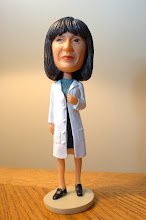 Recombinant bovine somatotropin -wow what a mouth full; must be why we abbreviate it to rBST or rBGH! While technically not an organic issue, because you can get non-organic milk without the use of rBST, it often comes up in organic conversations so it seems reasonable to talk about it here.
Recombinant bovine somatotropin -wow what a mouth full; must be why we abbreviate it to rBST or rBGH! While technically not an organic issue, because you can get non-organic milk without the use of rBST, it often comes up in organic conversations so it seems reasonable to talk about it here.Let's start at the beginning with what it is. Somatotropin is a protein hormone produced in the pituitary gland of animals, us included, that is essential for growth and development. Bovine is in regards to the fact that we are discussing cows and recombinant means that it is being produced in a lab using recombinant DNA technology.
SCIENCE ALERT! I won't be offended if you skip this part because you aren't interested, but for those of you who are, recombinant DNA is really interesting. (I spent a semester in college doing this & loved it!) You take a section of DNA that codes for the protein you are interested in replicating and insert it into a plasmid which is then inserted into a bacteria. As the bacteria multiplies copies of the protein are produced which can then be extracted and purified. Here is a video link for anyone who wants the visual.
Recombinant does not mean artificial or synthetic. The DNA that codes for the protein in the cow is extracted and produced by bacteria instead. The copies are identical and at the molecular level scientists cannot distinguish the original from the copied version. In fact we use recombinant DNA technology to produce human insulin and human growth hormone for treatment of human deficiencies.
So why do we give rBST to cows? Well, it increases their milk production about 10-15%.; but it may help to understand a little about a cow's lactation cycle. Cows produce the most milk just after giving birth to a calf and milk production falls off afterwards until it goes dry around 307 days later. If rBST is given when the lactation starts to decline, the cow will produce higher yields further into the lactation cycle. Since not every cow is in the same stage of lactation at the same time, not every cow is given rBST. At any given time maybe only 40% of the herd may be treated.
The amount of BST (recombinant or not) in the milk of a cow, yes, there is always BST in milk regardless of if the cow has been treated or not, is essentially the same. Tests indicate that cows given rBST have levels no higher than what can be found within the normal variation from cows that are untreated. The amount of BST present seems to have more to do with where the cow is in its lactation cycle than whether its been treated with rBST - makes sense that a cow just staring her lactation cycle is producing more BST to kick-off the process. It also appears that cows treated with rBST "burn up" the excess BST in the process of producing the milk.
So why the uproar? Well, partly because biotechnology always causes panic among some, partly because Canada & the EU do not allow its use, and partly because some claims about cancer have been made. But I will save those for next week's post...
The amount of BST (recombinant or not) in the milk of a cow, yes, there is always BST in milk regardless of if the cow has been treated or not, is essentially the same. Tests indicate that cows given rBST have levels no higher than what can be found within the normal variation from cows that are untreated. The amount of BST present seems to have more to do with where the cow is in its lactation cycle than whether its been treated with rBST - makes sense that a cow just staring her lactation cycle is producing more BST to kick-off the process. It also appears that cows treated with rBST "burn up" the excess BST in the process of producing the milk.
So why the uproar? Well, partly because biotechnology always causes panic among some, partly because Canada & the EU do not allow its use, and partly because some claims about cancer have been made. But I will save those for next week's post...






No comments:
Post a Comment